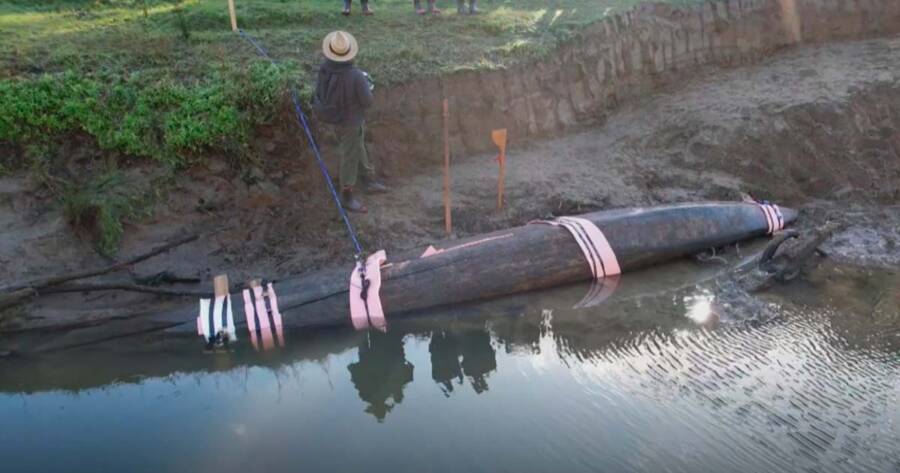The waka is believed to have been hidden by the Māori people in 1869 to prevent British colonizers from confiscating it.

Screenshot/1NewsThe waka was likely hidden to prevent it from being confiscated by British colonizers in the late 19th century.
A rare traditional canoe believed to be over 150 years old was just salvaged from the Pātea River in the Taranaki region of New Zealand.
The waka — the traditional canoe of the Māori people — was discovered when a group of Māori who were walking along the river to investigate the deaths of some fish nearby noticed that it was stuck in the mud at the river’s edge.
“To us it was found because of this kōrero [conversation] about a tohu [a sign] that happened about three weeks ago when tuna were found on the beach at Te Pātea,” local Māori elder Ngapari Nui told Te Ao Māori News. “They came up here and they were looking to see if there was any more dead tuna along the river here and that’s when they came across the taonga, the waka here.”
Shortly after the group discovered the waka, they contacted New Zealand’s Ministry of Culture and Heritage to examine the traditional canoe.
“As soon as I saw it, I knew it was a waka from the old people because it was made of tōtara,” historian Darren Ngarewa said, according to New Zealand’s 1 News.
Tōtara is a type of podocarp tree native to New Zealand, but as Ngarewa explained, the trees have been missing from the region for some time. Due to his ten years of experience working in a native nursery, however, he was able to identify the wood and determine that the waka must have been several decades old at least.
“I knew as soon as I saw it was tōtara that it was from a much older era,” Ngarewa said.
Based on the investigation, locals believe the waka was hidden in 1869 when the Crown captured and imprisoned the members of three local tribes: the Te Pakakohi, Ngā Ruanui, and the Ngā Rauru. Ngarewa says the waka was found near the site of Kuranui Pā, an iwi — loosely translated to mean “tribe” or “people” — settlement in Pakakohi that was nearly wiped out when its land was confiscated and its men imprisoned during the New Zealand wars.
“This is not something we talk about, a tapu, because of the pain we suffered,” Ngarewa said. “But with the waka coming out and the way it was coming out, it was unfolding as part of a bigger picture. Now maybe is the time to tell our story.”
The story is that 154 years ago, British colonial forces captured a local Māori chief named Ngāwaka Taurua and imprisoned him along with several other local elders.
When they fought back against the colonizers, the Crown deemed the men’s actions treasonous, and they were treated harshly during their imprisonment. Several of the men died as a result.
What’s more, the British colonizers also confiscated and destroyed the Māori’s wakas. Now, many believe that the newly rediscovered waka was hidden around that time to keep the Crown from finding it.
“We have spent so long reclaiming ourselves after so much interference by the Crown so to rediscover a part of our missing history, particularly on the 154th anniversary, is big for us,” said Ngāti Ruanui leader Debbie Ngarewa-Packer.
The waka is undergoing restoration in New Plymouth while local community members await a decision regarding its future. Many of them hope that the waka will be put on display in a nearby museum as a reminder of the region’s past and to educate future generations.
Local author Airana Ngarewa said that he believes the discovery is an important historical relic for his hapū — a term that means a political group or clan within Māori society.
“We are quite content to see this ancient artifact, a treasure from Pakakohi, a very ancient artifact from 1869 from what we know and it’s just been sitting in the river,” Airana says
After learning about this new discovery and some of New Zealand’s history, read about the study that suggested the Māori may have reached Antarctica 1,200 years before Europeans. Or, learn about the 930-year-old Native American canoe pulled out of a North Carolina lake.





